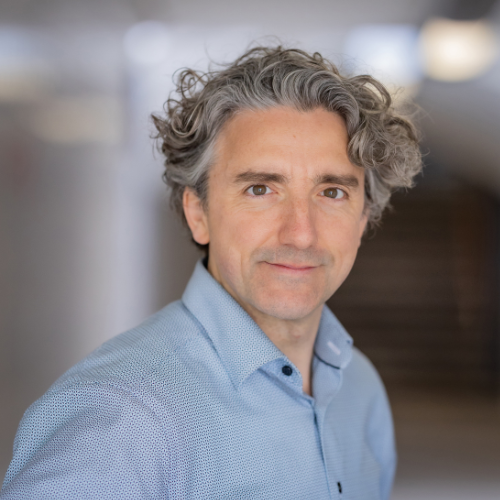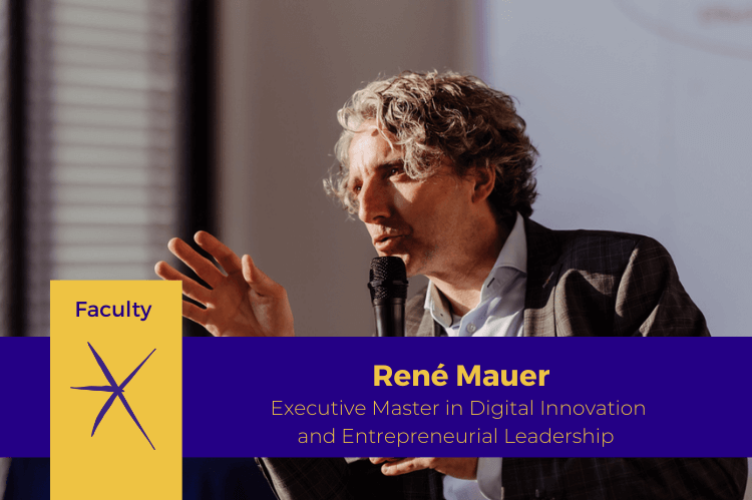Executive Master in Digital Innovation and Entrepreneurial Leadership
Meet the faculty: René Mauer
 Having co-founded a technology start-up, co-owned a family business, worked for SMEs and corporations like 3M, BASF, BMW, Deutsche Post DHL or P&G, René has a well-balanced skillset in entrepreneurship and innovation.
Having co-founded a technology start-up, co-owned a family business, worked for SMEs and corporations like 3M, BASF, BMW, Deutsche Post DHL or P&G, René has a well-balanced skillset in entrepreneurship and innovation.
He currently serves as the Chair for Entrepreneurship and Innovation at ESCP Business School's Berlin campus and leads the Jean-Baptiste Say Institute, the entrepreneurship department at ESCP across all campuses. René is also the creator and Academic Director of the Executive Master in Digital Innovation and Entrepreneurial Leadership (EMDIEL), a transformative and experiential programme designed for entrepreneurial individuals.
We had the pleasure of asking him about how he got into this field, the development of the EMDIEL, his passions in teaching and what he loves about working as a professor.
ESCP: René, let's start from the very beginning: How did you first become interested in entrepreneurship and innovation?
René Mauer: I grew up in a second generation family SME in landscape gardening, which constantly impacted our family life from childhood. I saw my parents working hard and long days, I felt how they were juggling a lot of responsibilities, but I also learnt how it fulfilled them to have an impact on the people they were working with and for. Eventually, my sister chose the engineering path, while I chose the management path - which for some time made me the black sheep (maybe still does :-)). Still, the particularity of running your own company always kept being a fascinating development path alternative.
ESCP: You had the idea to create the Executive Master in Digital Innovation and Entrepreneurial Leadership in 2015. What prompted you to develop a programme that was so different from everything else on the market back then?
René Mauer: I had the opportunity to bring a rough idea for an executive master to life. The first thing I learnt at ESCP was that entrepreneurship is a topic under development at the school, and that the people driving this development had a very experience- and impact-oriented approach to teaching it. With my personal love for executive education it was the perfect opportunity to work with people who had corporate or startup work experience and who asked themselves: what can come next for me as a person with an interest to drive exciting progress and necessary change?
ESCP: The EMDIEL has been and continues to be a truly international experience, currently taking place in 4 locations across 3 continents. Why did you find it important to make the EMDIEL a global programme?
René Mauer: To be frank: This question does not only come with excitement, it also comes with clear sustainability-related doubts. In that sense, the question should probably be: How can we still support the global nature of the EMDIEL programme when it creates a substantial carbon footprint. This is a tough debate in our team and within the school. Our line of argument is as follows: Progress and change is not only happening in Europe. It happens everywhere. It is probably even fair to say that there are places in the world where progress and change are happening at a much more crazy pace and intensity. Going to these places and learning with eyes, brain and body what that pace is and means has proven essential to the learning journey within EMDIEL. In addition, it is perspective-taking which is key to the programme, meaning that the learning experience is not only about “what are the others doing”, but also about “how do the others think about where the world is heading”. We are happy to see that some of our participants choose to spend more time in the far-out destinations.
ESCP: Since day one, you have also successfully created cohorts that are international, interdisciplinary, and combine perspectives from start-ups, corporations, and industry experts. Why is this mix of backgrounds so important to you and the EMDIEL experience?
René Mauer: Diversity is the breeding ground for great ideas - this is a regularly repeated message out there. And I believe that it is true. However, this message remains silent about the fact that a complex and complicated process lies between a diverse group of people coming together and that same group doing great stuff together. Our entrepreneurship community at ESCP is a strong believer in the fact that entrepreneurship can be a very personal process. In that sense, it is a key feature of EMDIEL to create your own specific entrepreneurial learning journey, but also to learn a lot from the diverse journeys of your peers. This creates richness in learning nuggets as well as in perspective-taking that eventually allows people also to explore the potential of joint activities.
ESCP: Those who do some digging into your research will soon notice that you have a couple of favorite topics, namely effectuation and ambidexterity. What are these concepts in a nutshell and what is your fascination with them?
René Mauer: Nice catch! :-) Effectuation was a revelation for me, and - I believe - the reason why I eventually followed through with and finished my PhD. It is a model that describes the decision-making logic of expert entrepreneurs who rely very little on prediction and rather follow a process that accepts uncertainty and applies principles that allow for the cheap and smart exploration of ideas. I was studying technology entrepreneurs from RWTH Aachen University for my Phd, and when effectuation was pointed out to me by my Phd colleague at that time and now successful Berlin VC Florian Heinemann, I knew I was onto something interesting. These days, I am researching, teaching, training and consulting on effectuation in the broader context of entrepreneurial decision-making, and I do that not not only for startups but also for established companies. These companies need to establish what we call “ambidexterity”, the two-handedness of exploiting existing business while at the same time allowing exploration of potential new business. In the exploration part I see a role for effectuation again, which is how these two topics are naturally connecting in my mind. Today, I have the pleasure of collaborating with a global network of practice experts who bring effectuation into the practice of established companies.
ESCP: Looking back at your career, what are you proud of today? What did you expect and what truly surprised you? What was your most memorable entrepreneurial experience?
René Mauer: I am proud of being able to say that I did take a good number of decisions based on intuition. Early on, I followed my parents' advice: “René, you want to study business administration and management, and all you know is our landscape gardening family SME. Go and look into a big one first because we believe it will be quite different.” While following their advice, I also followed my intuition. Instead of joining a large German car manufacturer (parental preference), I joined 3M, a company that I did not know a lot about, except that it was known for innovation. After finishing business school, I followed intuition of not joining a consultancy but instead joining a fully-fledged university with a lot of technology, engineering and innovation potential.When I pursued my PhD, I chose a topic that excited me, even though my immediate work environment was unfamiliar with both the theory and method. This decision led to a considerable lengthy PhD process.
Looking back, I expected 3M to give me a proper initial training in the practice of business administration, WHU to give me an excellent academic training in this field, and RWTH Aachen to allow for a Phd in a multi-disciplinary context. Surprises are in all the details of how my career then unfolded. I started theater at WHU as a hobby, surprisingly leading me to improv theater, surprisingly leading me to ESCP with its unique emphasis on art and entrepreneurship. Effectuation led me to meet Michael Faschingbauer and a now surprisingly global community of experts with whom I am developing practice-oriented tools, methods and trainings based on effectuation. At Aachen University I was able to dive into amazing technologies and eventually - and surprisingly - also join a technology start-up. And then this crazy personal surprise conclusion that after coming to like start-up support, teaching and research, an academic career might be a path ahead for me. When I had joined RWTH Aachen for the Phd, I certainly did not have any idea of being a professor for entrepreneurship and innovation at some point in time. There are many amazing entrepreneurial experiences, usually connected to the smaller and bigger successes that belong to this path. However, what also sticks with me is the memory of the moment when we decided to close our technology startup. I teach students that entrepreneurship very often means to strongly believe in what is in the end an undone thing, and to persevere with it. At the same time, many entrepreneurial projects do not work out, which means that entrepreneurs often need to let go. The experience of this crazy tipping point is an intense and lasting memory!
Campuses
